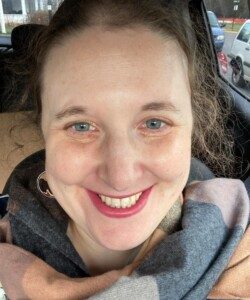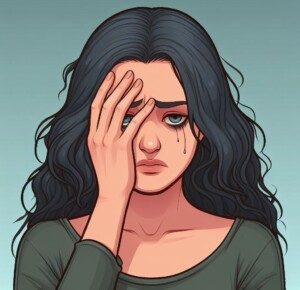Ariadne eloquently describes the difference between her severe childhood trauma and the way her innate autism affects how she processes and sees the world.
For a lot of years, I thought my autism diagnosis was wrong. I was convinced it was just trauma.
I have a right to claim my trauma, and it was a right that was denied to me for years.
When I finally told a family member that my dad had abused me, she told me, and I quote, “That can’t be true.”
My mother said the exact same thing. They’re both wrong. It can be true, and it is.
When you’ve been traumatized like that, hurt to the bone of whom you are, you lose all these parts of yourself.
You lose the person you might have been. I used to sit outside of wherever I was living at the time, and stare at the horizon, thinking about everything I never had a chance to do with my life, everything I will probably never have a chance to do.
I did not have the capacity to think about my autism. Instead, I thought about trauma, and eventually, I thought about mental illness.
Far too many of us know that being diagnosed with mental illness comes with trauma, and it comes with being neurodivergent too.
When you’re a woman or a femme-presenting person, and you have sexual violence in your history and abusive parents as well, psychiatry sees you as a target, a puzzle to be solved.
I’ve been diagnosed with just about everything you might imagine. I’ve been told I was delusional and imagined the abuse that still lingers in my muscles and damaged the nerve endings in my pelvis.
Psychiatrists have told me I am a narcissist, told me I have borderline personality disorder, told me I am depressed and anxious and bipolar, prescribed lithium and Seroquel and a long list of SSRIs and mood stabilizers.
I’ve had some good therapy, and a lot of truly awful therapy, from people who should never have gone into a profession that required interacting with other people.
I’ve been accused of somatizing, making up, my serious physical health conditions – not sure how chronic bronchitis or cyclic vomiting could be imaginary, but that’s what I was told.
All these experiences were devastating to my sense of self, and I would not wish them on my worst enemy, but they happened to me.
Being a survivor of psychiatric abuse has become a precious part of who I am.
Survival is a slow and painful process that takes work and takes years to achieve, and I have survived far too much for just one lifetime.
Then, again, there is autism.
The child psychiatrist who diagnosed me with autism stated things like my unwillingness to talk to him as evidence.
Now, I’m not sure how many of you were forced to answer questions about your deepest secrets to a total stranger at seven years old, but it is not a lot of fun.
He was a man, and he talked to my parents much more than he talked to me, and I did not trust him.
For years, I thought that’s why he diagnosed me. I thought that like so many adults in my life, he simply did not understand where I was coming from, and he was too lacking in empathy to understand what my motivations might be.
I thought his diagnosis was covering his own ego.
It’s true that when I was a child, I barely had any friends.
My mother forced me to spend time with children I did not like or want to hang out with, because they were daughters of her own friends or people she wanted to be friends with.
I became a pawn she used to keep her own relationships together.
Meanwhile, the children I actually felt drawn to, the ones I begged my mother to spend time with, she refused.
Most of the other children I actually liked were not white, middle-class, able-bodied, like the ones she wanted me to belong to.
I learned to be alone and be glad of it, so at least I was not spending time with people who either bullied me or whom I had nothing real in common with.
Also, there was the abuse. When you’re abused, you have a secret.
That secret grows bigger and bigger inside of you until it blots out everything else you’d like to be, all the things you are trying to become.
You make decisions based on that secret, based on keeping that secret but trying to get your needs met above and around it.
I was hungry all the time from being underfed, exhausted from trying to keep myself awake so I would not be abused, tense, afraid, often in a great deal of unspoken pain.
These experiences became a barrier between me and everyone else.
I learned that alone or with people who did not truly care about me were best, as these were the conditions necessary to keep my secret safe.
The person I was as a child – shy, secretive, silent, fearful of intimate friendships, terrified of men – that person is who I became because of the abuse. I know that, because I am none of those things now.
The more I unpack the years of abuse I suffered, the farther I get from being that little girl, isolated and afraid, barricading herself in with her sadness and her misplaced shame.
Sometimes I wonder whether anyone has any idea what autistic people are “really” like.
So many of us lived through immense childhood abuse, at the hands of our parents, other adults who scapegoated us, or children who bullied us.
How many of the supposed symptoms of autism are really about what happens when you are treated bad enough, when you are treated like a monster, when you are isolated and abused?
- Because what I know is, when I am happy, when I feel safe, I act completely differently.
- I still don’t act “normal!” Instead, I act like…something else entirely.
When I am happy, I move my hands, sometimes shaking my body excitedly.
I speak my mind, in the concrete, literal, direct terms that autistic people are so known for, the terms that neurotypical people so often find extremely disrespectful or impolite.
I don’t act a thing like I did as a child, but I also act nothing like neurotypical people either. I act like me. I act like us.
Last year was the first time I met other “out” autistic people as a grownup.
I think I knew I was autistic when I invited my autistic friend to a summer party I threw, and she was the only person I really wanted to hang out with. It was like we understood each other. We spoke the same language.
I always believed in the back of my mind that if I accepted I was different, really accepted it, my life would be over. Now I know that I was wrong. My life is just beginning.
I am a survivor of severe childhood trauma. The trauma was so bad that I sometimes wonder why I did not die.
I think the reason was a lot to do with autism, actually. I could see my way to solutions other people might not have found.
I understood things about myself and about the people around me that told me intuitively how to keep myself safe.
The difference between my autism and my trauma is this: The trauma I experienced burrowed holes into the tree that was my sense of self.
I have spaces missing and large gaps because of the trauma I experienced.
My autism, on the other hand, is like a blanket of flowers covering both sides of my tree. My autism makes even my broken self so, so beautiful.
 As a professional writer, Ariadne Wolf works cross-genre in creative nonfiction, fantasy and historical fiction. Having an MFA in creative writing, Ariadne’s publishing credits include DIN Southwest Literary Magazine, Ashoka University’s Plot Number Two, and others, and has been awarded residencies with Alderworks, Sundress Academy for the Arts, and Rockvale, among others.
As a professional writer, Ariadne Wolf works cross-genre in creative nonfiction, fantasy and historical fiction. Having an MFA in creative writing, Ariadne’s publishing credits include DIN Southwest Literary Magazine, Ashoka University’s Plot Number Two, and others, and has been awarded residencies with Alderworks, Sundress Academy for the Arts, and Rockvale, among others.



























